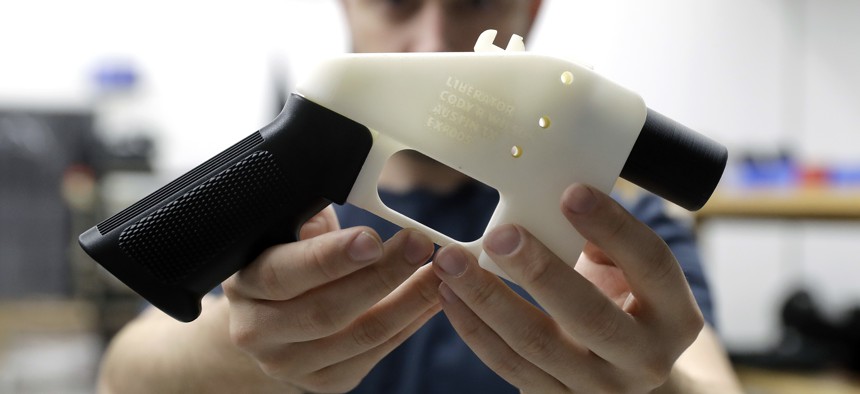States Sue Trump Administration Over 3D-Printed Gun Regulations

Cody Wilson, formerly with Defense Distributed, holds a 3D-printed gun called the Liberator. Eric Gay/AP Photo

Connecting state and local government leaders
The state attorneys general say they fear making online designs to create “ghost guns” more accessible will lead to violence.
Twenty states and the District of Columbia are jointly challenging the Trump administration’s easing of regulations on so-called “ghost guns.”
The new rules by the Trump administration, which go into effect in March, would remove the software files needed to design and 3D print untraceable plastic guns from the U.S. Munitions List and transfer the regulation of these weapons from the State Department to the Department of Commerce. Critics say the changes mean the designs will be widely available online.
According to the group of attorneys general, allowing the software design files to be posted online would “effectively deregulate 3D-printable gun files entirely” and would make firearm files “instantly [and] easily accessible both within the United States … and outside the United States.”
The attorneys general filed the lawsuit about the rules last week at the U.S. District Court in Seattle. The attorneys general from New York, California, and Washington state are leading the group.
New York Attorney General Letitia James tweeted that it’s too dangerous to make these blueprints publicly available. "These files allow anyone to simply go online and download files to print and assemble guns, including assault rifles," James said. "These 'ghost guns' are unregistered, untraceable, often undetectable and risk the lives of every American."
The current lawsuit isn’t the first that state attorneys general have brought to stop the distribution of ghost gun files. The same group of states also brought a lawsuit against gun CAD (computer-assisted design) files in 2018.
That lawsuit was spurred by the creation of DEFCAD, a searchable online library for printable guns run by Defense Distributed, a nonprofit organization in Texas. According to the group’s website, the model repository for “the digital gunsmith” was founded in 2012 and had millions of downloads in 2013 before the State Department forced it to close. The company sued the federal government in 2015 and settled in 2018 when the Trump administration reversed the Obama-era decision to ban online distribution of the blueprints.
DEFCAD was then live again for five days before 20 states and the District of Columbia filed a lawsuit to halt the distribution of 3D-printed gun software online. A federal judge in Seattle issued a temporary restraining order to block the online publication of blueprints. In November 2019, he later ruled that the administration’s change to distribution regulations was improper because the State Department did not give a “reasoned explanation” for making it.
In his ruling, Judge Robert Lasnik wrote that “the agency is required to disclose the basis for its action,” especially given its prior position regarding the need to regulate 3D-printed firearms.
“Until April 2018, the federal government regulated … the design and production of weapons using a 3D printer because … they could slip through conventional security equipment [and] would allow terrorist groups and embargoed nations to evade sanctions, repair weapons, restock arms supplies, and fuel violent regional conflicts,” Lasnik wrote. The State Department then offered “no analysis of the potential impacts of removing the CAD files for 3D-printed firearms from the [U.S. Munitions List and] no response to the public comments raising concerns about such a removal.”
Defense Distributed responded to the lawsuit in a statement, saying “we have come to expect this kind of laziness and basic error from district judges.”
The lawsuit brought by the states against the federal government questions the new element of the rule changes, the transfer of regulatory powers from the State Department to the Department of Commerce, which the attorneys general argue would "effectively [allow] unlimited distribution” of 3D-printed firearms.
The State Department currently regulates all purchases and exports of firearms through the U.S. Munitions List. The USML has strict requirements, which means the State Department has to consider aspects like national security and terrorism when creating regulations. The Trump administration wants ghost gun files to be regulated on the Commerce Control List, which is comparatively less stringent.
Several attorneys generals released statements expressing their confidence that they could win a similar legal battle to the one they started in 2018. Washington Attorney General Bob Ferguson expressed displeasure at the need to reopen the issue. “Why is the Trump Administration working so hard to allow domestic abusers, felons and terrorists access to untraceable, undetectable 3D-printed guns?” Ferguson said in a statement. “Even the president himself said in a tweet that this decision didn’t make any sense—one of the rare instances when I agreed with him. We will continue to stand up against this unlawful, dangerous policy.”
Emma Coleman is the assistant editor for Route Fifty.
NEXT STORY: Supreme Court Allows Trump Administration to Move Forward with 'Public Charge' Rule





